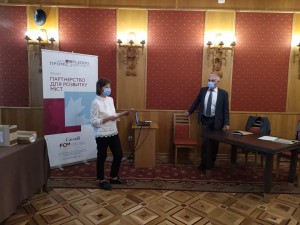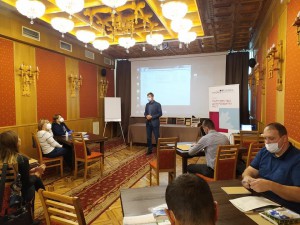 Together with the Association of Ukrainian Cities, PLEDDG experts took part in a two-day training on October 8 and 9 in Ivano-Frankivsk in the framework of the special short-term training program “Strategic environmental evaluation of documents of governmental planning” for specialists of local self-government bodies.
Together with the Association of Ukrainian Cities, PLEDDG experts took part in a two-day training on October 8 and 9 in Ivano-Frankivsk in the framework of the special short-term training program “Strategic environmental evaluation of documents of governmental planning” for specialists of local self-government bodies.
The purpose of the training is to strengthen the competencies of representatives of various levels of local self-government bodies in assessing the environmental risks of strategic documents and their prevention at the planning stage.
Thanks to a comprehensive environmental assessment of a development program, a city or community can solve several important issues at once:
- identify the consequences for human health and the environment that the implementation of planned initiatives may lead to and find alternative solutions;
- to combine the achievement of economic goals and the solution of environmental problems;
- improve the system of partnerships between key authorities, businesses, and civil society, which would contribute to more informed and balanced decisions.
The instructors and developers of the SEE curriculum are experts from the PLEDDG Strategic Planning Project, the Association of Ukrainian Cities, and professors from the Kyiv-Mohyla Academy.
Senior Expert in Intergovernmental Cooperation and Economic Development at PLEDDG, and instructor of the training program, Oleksandr Ignatenko commented that:
 During the two days of training, participants have increased their knowledge of the legal framework for environmental assessment, practiced the analysis of case studies, through which they found answers to the questions: how to organize an effective SEE; how to identify measures for the community to prevent or mitigate the negative effects on the environment and health; how to involve key stakeholders and the public in an objective environmental analysis of strategic documents.
During the two days of training, participants have increased their knowledge of the legal framework for environmental assessment, practiced the analysis of case studies, through which they found answers to the questions: how to organize an effective SEE; how to identify measures for the community to prevent or mitigate the negative effects on the environment and health; how to involve key stakeholders and the public in an objective environmental analysis of strategic documents.
The training program was attended both by representatives of local self-government of the Ivano-Frankivsk Oblast who are involved in the development of strategic documents and by specialists of the Department of Ecology and Nature Management of Ivano-Frankivsk Regional State Administration. This allowed for closer cooperation between specialists who develop strategic development programs and coordinate them in terms of environmental risks.
Ivano-Frankivsk was one of the first cities to receive the support of PLEDDG to conduct an environmental evaluation of the urban development strategy, and already had some success in planned environmental activities. Nadia Kromkach, Manager of the Economic and Integrational Development Department of Ivano-Frankivsk City Council shared her impressions of the participation in the two-day training:
Preserving biodiversity and protecting the environmental rights of the population are essential components of safe and balanced urban development. Therefore, the integration of environmental policy into all aspects of the social and economic development of territories is a fundamental principle of PLEDDG and a focus in cooperation with partner cities.

